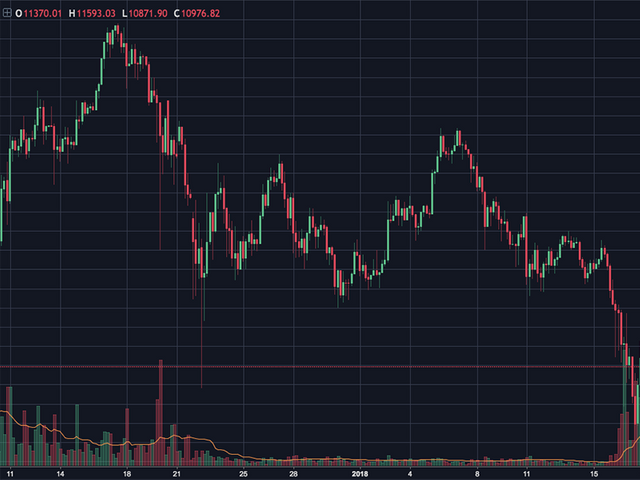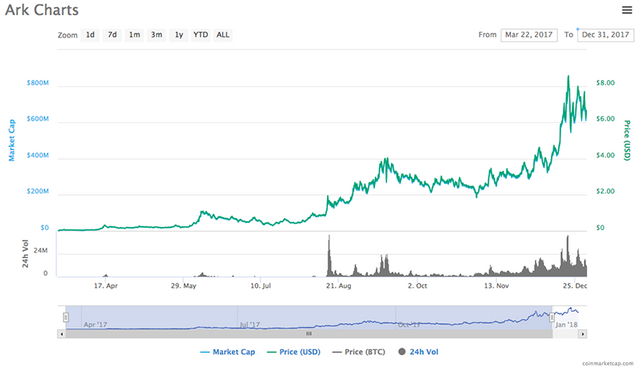Fundamental Tips for Investing in the Volatile Crypto Market
The cryptocurrency market is growing fast, and it’s an exciting time for everyone following the market, the news, and the projects currently under development. But anyone considering investing or using crypto needs to understand that the technology and markets are both still in their early stages. Even many of the largely unregulated asset exchanges, which operate 24/7 and are open to users worldwide, are still finding their footing. This is a recipe for highly volatile markets.
While the most noticeable recent examples are the mid-January and early February dips when the entire cryptoasset market dropped 43% and 53%, respectively, in a matter of days, let’s look at a few other examples from 2017 to put the consistency of crypto market volatility into perspective.
According to 2017 daily closing prices on CoinMarketCap, the price of Bitcoin moved between 10-19% on 19 different days, and Bitcoin’s price changed at least 20% or more on 3 separate days. That’s about 6% of the year when Bitcoin’s price moved at least 10% in a day. (Source 1)
Take another cryptoasset, Ark. Ark saw price movements of 10-19% on 90 different days and movements of 20% or more on 25 days during 2017. And Ark didn’t even launch its blockchain until March 21, so trading only took place on 285 days during the year. This means that 40% of the time Ark’s price changed more than 10% from the previous day. (Source 2)
These price movements may seem insane, but they are not uncommon in crypto. (Source CoinMarketCap.com)
This volatility is part of the market, and while it’s definitely part of the excitement, it can be downright stressful; in crypto it’s not uncommon to see a diversified portfolio dip or rise 10% or more in a matter of hours.
Now let’s compare this volatility to a more traditional investment, the S&P 500. How many days did the price of the S&P 500 change 20% or more in 2017? Zero. What about days where it saw a price shift between 10-19%? Not a one. In 2017, the largest percent change in daily closing price was 1.8%, and the index only moved 1% or more on 10 days out of the entire year. Yet, the index had a pretty fantastic year with total gains of 18% over 2017. (Source 3)
How many days did Ark’s price only move 1.8% or less during 2017? A total of 48 days. As you can see, there is a huge difference in what should be expected from dabbling in cryptoassets.
Both Bitcoin and Ark made considerable gains during 2017, dwarfing those made by the stock market. But, of course, that all depends on when you invested – those that bought Bitcoin near its peak are down quite a bit at the time of writing. This is why it’s important to be prepared for the volatility – and to use it – the best you can.
Strategy Basics to Prepare Yourself for High Volatility Investments
Whether you’re a seasoned investor or not, the following tips work in any market, not just crypto.
1. Know yourself and your limitations.
Each of us has a different tolerance for risk. Be honest with yourself about how much risk you’re willing to take with your investments. The big name cryptoassets will experience high volatility compared with more traditional investments, and the lesser known cryptos will likely experience even more.
Also, acknowledge that you don’t know where the price of an asset will be in the future, and you will not be able to reliably pick the top or bottom of the market. Plan accordingly and minimize price risk by using simple strategies such as laddering and dollar cost averaging.
2. Do not invest more than you are willing to lose.
While we all expect great things from cryptoassets in the future, not all of them will succeed, and it’s possible some of the projects you choose will fail and be worth nothing. Generally, it’s recommended to invest no more than 10-15% of your entire investment portfolio in high-risk assets (such as crypto).
3. Diversify your investments.
Buy more than one cryptoasset, and do not listen to anyone that is “all-in” on one investment. It is wiser to split up the risk you are taking and hope any successful cryptos you invest in will more than outweigh any losses from projects that fail. Diversification does not ensure success, but if done right it will give you a greater chance for success.
4. Believe in the long-term success of cryptocurrency projects you invest in.
Always make sure you research projects before putting any money into them, and plan on holding the asset for several months if not years. The crypto projects that succeed will not reach their full potential until the technology becomes more widely adopted, which will take time. Furthermore, if you believe in a project’s long-term goals, short-term price swings are less likely to faze you. (Actually, if you truly believe in a project you may be more likely to buy more of an asset if its price has gone down. This is not a bad strategy.)
5. Don’t buy (or sell) based on emotions.
If you enter your investment with a long-term expectation and expect to see volatility, it will be easier to stay calm during any price swings. Don’t purchase an asset based off of FOMO (fear of missing out) when prices starts shooting up, and don’t sell due to FUD (fear, uncertainty, and doubt) when they start going down. Prices can just as easily revert back to where they were before you emotionally bought or sold, leaving you with less value in your portfolio.
6. Plan your entry (and exit).
All of your purchases and sales should be planned. Know how much you want to invest in each cryptoasset and know when you plan to take profits if an asset appreciates in value. A few easy to use entry strategies are the ladder and dollar cost average strategies.
Conclusion
In the cryptocurrency marketplace, prices can fluctuate even more wildly than in traditional markets, making it all the more important to have a strategy. Investors should plan their investments carefully and use any available tools within a broader strategy to minimize the amount of risk such a volatile market poses.
Sources 1 & 2 data from CoinMarketCap.com
Source 3 data from Yahoo Finance
Featured image taken from TradingView.com


Hi! I am a robot. I just upvoted you! I found similar content that readers might be interested in:
https://blockadopter.com/fundamental-investment-tips/